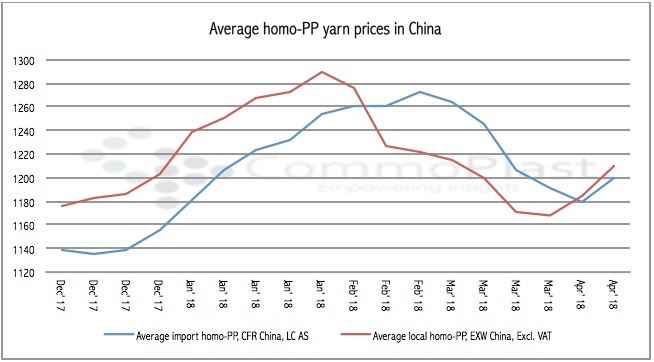Local homo-PP in China regains premium over import, sustainability in question
Local homo-PP in China regains premium over import, sustainability in question

After eight consecutive weeks of being traded below import market, homo-PP prices based on EWX China has regained its premium thanks to a visibly improved in replenishment activities among local buyers.

Compared to late March 2018, the average local homo-PP prices have increased approximate CNY260/ton ($41/ton) while import offers only gain about $20/ton in the same period. However, buying interest in China started waning off toward the end of this week, from which players are asking a question of whether the local market would be able to maintain its position in the coming week?
The two final trading days of the week see an accumulated reduction of CNY100-200/ton ($16-32/ton) in spot homo-PP and an increase in inventories at Sinopec and CNPC by 10,000 tons day on day to approximate 790,000 tons as of 13 April 2018. At the time this report is published, homo-PP yarn traded in Eastern China in the range CNY8850-8950/ton ($1200-1214/ton without VAT), EXW China, cash equivalent.
“There is high chance that local prices would continue to fall in the coming week given that many of our customers have already replenished comfortable inventories over the past two weeks. Having said so, we do not expect any large reduction as supply might tighten in the near term amid heavy maintenance shutdown season,” a trader in Shanghai commented.
Seven PP producers in the country are planning major maintenance works from March to May, which might take nearly 290,000 tons of production out of the market. And this could be a big card helping local suppliers to prevent prices from any deep plunge, sources said.

“Besides, the stronger energy complex and propylene market would provide some support, too. As a result, we don’t expect the prices gap between local and import cargoes to be too wide,” another trader added.
From another aspect, the recent strengthening domestic ground has lifted the sentiment in the import market; however, would domestic sellers started offering more discounts in the near term, the impact on overseas offers is inevitable. “May is traditionally low season for us, and therefore we prefer not to keep too high inventories, especially at the current tightened credit from banks,” a BOPP sheet maker commented.
